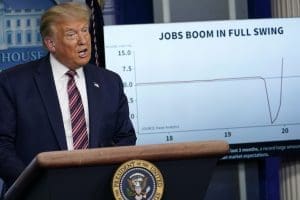Trump swears he's bringing jobs back to the US. He's done the opposite.
Trump’s claims of vast job creation are easily debunked.

An auto component company founded by Donald Trump’s Commerce Secretary Wilbur Ross is the latest firm to close down a plant in the United States and move its jobs abroad, despite Trump’s repeated claims that he would bring manufacturing jobs back home.
International Automotive Components will close its plant in Huron, Ohio, on Oct. 31. Its production has been transferred to factories in Mexico and other locations, Bloomberg reports. The plant’s closure, the result of a decision made before the COVID-19 pandemic, was announced last Christmas.
Nearly 300 people at the company have since lost their jobs.
Despite Trump’s “America First” agenda and repeated claims that he would bring jobs back to the United States, recent data shows he’s done the reverse, sending even more American jobs elsewhere.
During a press conference on Sept. 7, Trump claimed: “Many plants are being built right now — auto plants — in Michigan, just like I said. They’re being built in Ohio, they’re being built in South Carolina, North Carolina, they’re being built all over and expanded at a level that we’ve never seen before. Cause I said to Japan, Germany and others, ‘Sorry, you’ve got to come here and build plants, otherwise we’re going to have to make it very tough on you with tariffs.'”
Trump claimed on Sept. 29, during the first presidential debate, that he “brought back 700,000 jobs” in the manufacturing sector.
As early as his fourth month in the White House, Trump was being fact-checked on statements such as his assertion that jobs are “not leaving the country anymore, folks. They’re not leaving, they’re staying and they’re building right here.”
But from his inauguration in January 2017 through last month, manufacturing employment in the United States was down by a net of 164,000 jobs.
The economic downturn during the coronavirus pandemic has resulted in manufacturing sector employment dipping to its lowest level since 2014, the Washington Post reported.
And jobs are still moving offshore. The U.S. Labor Department approved 1,996 petitions for Trade Adjustment Assistance for workers whose jobs were being moved overseas, covering a total of 184,888 jobs moved overseas during Trump’s first 3 1/2 years in office.
Trade wars Trump initiated with U.S. trading partners wreaked havoc on the auto industry: Tariffs imposed on imported steel reportedly cost General Motors $1 billion, and in 2018, the company announced that it would lay off 14,700 workers in North America and possibly close five of its plants.
That same year, Trump claimed that he’d spoken to David Burritt, the CEO of U.S. Steel, and that Burritt had told him, “We’re opening up six major facilities and expanding facilities that have never been expanded.” The easily fact-checked claim was debunked, and U.S. Steel has not opened six major facilities in the United States.
In May 2019, prior to the onset of the coronavirus pandemic early this year, ProPublica published a report on the millions of jobs Trump claimed to have created at specific companies, claims that had little basis in reality. It concluded: “Since the election, Trump has made 35 claims that companies would create 8.9 million jobs in the U.S. thanks to his policies and actions. Some of the new jobs he touted failed to materialize. Many of the new jobs he took credit for were, in fact, planned before he took office. … The bottom line: Only 797 jobs are attributable to Trump, according to the companies that did the hiring.”
Last month, during a campaign speech in Ohio, Trump said he “saved” the coal industry: “I put our miners back to work.” But data shows that 5,300 coal mining jobs had been lost under Trump as of August, and U.S. coal production had dropped to its lowest level since 1978.
Additionally, the Institute on Taxation and Economic Policy notes, the 2017 Tax Cuts and Jobs Act, which slashed taxes for the superwealthy and benefited large businesses, included a loophole offering a 0% tax rate on a large proportion of profits generated by U.S. corporations overseas, creating added incentives for them to relocate their operations to other countries.
Recommended

Biden calls for expanded child tax credit, taxes on wealthy in $7.2 trillion budget plan
President Joe Biden released his budget request for the upcoming fiscal year Monday, calling on Congress to stick to the spending agreement brokered last year and to revamp tax laws so that the “wealthy pay their fair share.”
By Jennifer Shutt, States Newsroom - March 11, 2024
December jobs report: Wages up, hiring steady as job market ends year strong
Friday’s jobs data showed a strong, resilient U.S. labor market with wages outpacing inflation — welcome news for Americans hoping to have more purchasing power in 2024.
By Casey Quinlan - January 05, 2024
Biden’s infrastructure law is boosting Nevada’s economy. Sam Brown opposed it.
The Nevada Republican U.S. Senate hopeful also spoke out against a rail project projected to create thousands of union jobs
By Jesse Valentine - November 15, 2023














































































